Hair plays a large part in a woman’s identity and new research has revealed it also has an effect on our mental health.
Sadly lush hair on women symbolises vitality, beauty and is often how women identify their sense of self worth but according to Australian company évolis, only 45 per cent of women will keep a full head of hair.
‘The most common cause of hair thinning or hair loss in women is Female Pattern Hair Loss (FPHL),’ Dr Eleni Yiasemides told Daily Mail Australia.
‘This is an inherited disorder and the hair loss can come from either the mother’s or father’s side of the family. Female pattern hairloss is very common.’
Lush hair on women symbolises vitality, beauty and is often how women identify their sense of self worth but according to an Australian company, only 45 per cent of women will keep a full head of hair
Society in general places a great deal of value on people’s appearances and hair is a major factor.
Unfortunately Female Pattern Hair loss isn’t something that society talks about very often.
‘From a scientific point of view, our obsession with “looks” is based on a longstanding evolutionary drive for us to find good partners to produce children that are healthy,’ Dr Eleni said.
‘What is considered “beauty” is a universally accepted concept and transcends all cultures, religious beliefs and racial backgrounds.’

Society in general places a great deal of value on people’s appearances and hair is a major factor
Although hair loss is considered a relatively mild dermatological condition, it can result in significant emotional distress as well as self-esteem issues.
The research also revealed that 40 per cent of people in Australia who have experienced hair loss have lost their confidence, whilst one in three reported having a lower self-esteem and one in five became depressed.
‘There are other causes of hair thinning and these include health conditions that can cause hair to fall out including imbalance in hormones, autoimmune illnesses, thyroid conditions and iron deficiency,’ Dr Eleni explained.
‘This type of hair loss generally is reversible when the underlying medical disorder is treated.
‘There are lots of infomercials promising “miracle cures” which are are false and add to a woman’s disappointment and cynicism about this condition and its treatment.’

Although hair loss is considered a relatively mild dermatological condition, it can result in significant emotional distress as well as self-esteem issues
Dr Eleni said that some of the signs of hair loss that women should be looking out for is increased hair shedding, noticeable thinning and thinner ponytails.
For women who are experiencing hair loss the hair on the back of the scalp or around the sides won’t be effected and you will never see a ‘shiny smooth bald patch’ like you do on men.
Luckily there are ways that women can get volume back without spending a fortune.
‘There is a lot of products on the market that promise thicker, fuller hair and unfortunately, most of these products do not live up to their advertised hype,’ Dr Eleni shared.
‘This leads to women with hair loss becoming even further depressed about their hair loss.
‘It is important for women to know that there are effective treatments. A woman suffering from hair loss should see a dermatologist to have their hair accessed to determine the correct cause of the hair loss and therefore most appropriate treatment.’

‘There is a lot of products on the market that promise thicker, fuller hair and unfortunately, most of these products do not live up to their advertised hype,’ Dr Eleni shared
Dr Eleni said that there are multiple things that can cause temporary hair loss.
‘This can be related to stress, hormonal changes, changes in medications, low iron levels, changes in diet, severe weight loss, thyroid disease, severe illness etc,’ she explained.
‘This is not FPHL but a separate condition and will completely reverse when the underlying medical issue is corrected.’
The key is to start treatment early and unfortunately there is no cure or prevention and any treatment women undertake are life-long.
Dr Eleni also explained that it generally takes six months of treatment before people see results and the ultimate goal is to stop it from getting worse.
‘Taking vitamins or supplements, or changing the diet will not impact at all on hereditary pattern hair loss.’
